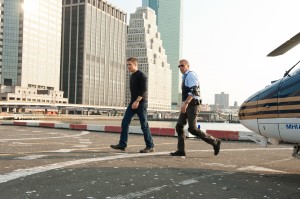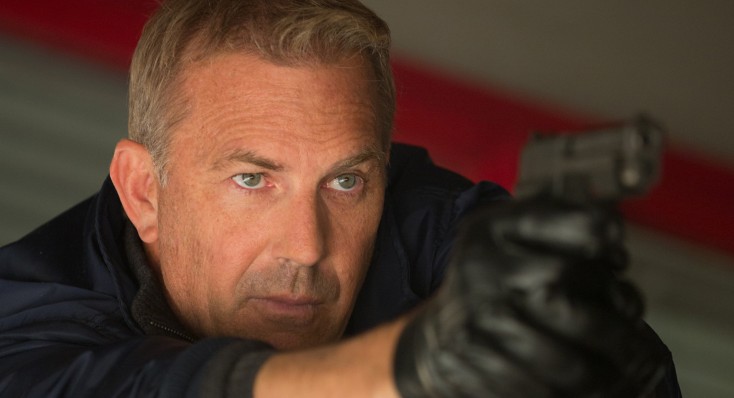
(l-r) Chris Pine is Jack Ryan and Kevin Costner is William Harper in JACK RYAN: SHADOW RECRUIT. ©Paramount Pictures. CR: David Lee.
By ANGELA DAWSON
Front Row Features
HOLLYWOOD—Aside from his turn in The History Channel’s Emmy winning “Hatfields & McCoys” and a small, supporting role in “Man of Steel,” two-time Oscar winner Kevin Costner has pretty much been absent from the Hollywood scene for about five years.
Turning 59 on Jan. 18, the still boyish-looking actor explains that he has been busy raising his three youngest children with wife Christine Baumgartner. But after putting in the proper amount of quality parenting time with his kids, the actor/writer/director/producer is ready to get back in the acting game. He’s already got a few films under his belt that are slated for release this year. He plays an NFL football coach in the upcoming “Draft Day,” a grieving widower fighting for custody of his child in “Black & White,” a track coach in “McFarland” and a newly retired spy called back into duty in “3 Days to Kill.”
But first, the veteran leading man helps kick off the rebooted Jack Ryan spy thriller franchise as the mentor figure to “Star Trek’s” Chris Pine, who plays the Tom Clancy-created spy hero.
Sporting a stubbly beard, Costner recently spoke about playing the mentor role, staging his big screen comeback and how a certain Scottish leading man provided him with some words of wisdom that are forever ingrained in his memory.
Q: You’ve been in Russian spy thrillers before such as “No Way Out.” How have things changed from the 20th century to the 21st century for this form?
Costner: I don’t know what’s changed, really. Hopefully, when our movies are realer, they get realer than when they happen to be the James Bond situation, where a guy parachutes in and that kind of thing. That’s another kind of spy movie. So I don’t know. Our job is to entertain and to find the rhythms that do that, the language of the day. Hopefully, we don’t try to reinvent the wheel, because spies are trying not to get caught, trying to stop bad thing. So, hopefully, the level of sophistication always is going up.
Q: You were once supposed to play Jack Ryan in “The Hunt for Red October,” so were you already prepared to play the mentor figure in this?
Costner: The mentor role is always about what can you offer a younger man or what can you offer a younger woman, things in your level of experience. That, by definition, is the mentor. That’s what I was. If you read it on paper, that’s the role that’s meant for me. Chris (Pine) inhabited perfectly his role. What I liked about my role was that I wasn’t just a person at a desk on a phone going, “Get the **** out of there. What the **** are you doing? Well, you need to do it faster.” Kenneth (Branagh, the director) was able to say, “I want to incorporate some of your skill set into this so even though I’m a stupidvisor, I could take the gloves off, so to speak, and become involved and bring a physical presence and team up with him at the right moment. I thought that was unusual for the mentor role. Usually, the mentor is back in Washington or he’s in a big, giant control room. In this instance, we were always fairly close together and trying to sort it out a little bit together. As the movie progresses, you see that he just possesses a lot of intuitive skills, whether it’s being how to survive or to process a lot of information in a very quick way. I actually ask him a couple times to slow down, remembering that I’m in another century. (He laughs.)
Q: Can you talk a little bit about career longevity, because you have a lot of films coming out this year?
Costner: This might come as a surprise to you but I didn’t make my first check until I was about 27 or 28 years old. I didn’t burst on the scene at 19 or 20. If you think about the guys in my category, I probably have about half the movies that they have, if you added them up. But I had three little kids the last five years, my wife and I, and I slowed down (my career) to get them started. But I’ve had enough of that ******* minivan. (He laughs.) I just had to get a minivan because my back was killing me with the SUV, three seats and ****. I thought, I have to go back to killing somebody for real or action movies, because this is too tough. About the last year and a half, after I did “Hatfields & McCoys” (miniseries) and got on a horse again, I started to feel my love of acting. And so about a year and a half ago I amassed a series of movies that are going to come out soon. It’s unusual for me to go back to back (with movies). But longevity, for me, is not a check. It’s a love. I’ve loved making movies. I’ve loved living my life outside the lines of Hollywood. So when I come to work I like to work, and I like to work with people that are very specific. I have been fortunate, blessed, loved, and it’s added up to 30 years.
Q: At the end of “Jack Ryan: Shadow Recruit,” you refer to Jack as something of a boy scout, which reminded me of some of your famous roles, specifically Elliot Ness, in which you co-starred with Sean Connery. So how does it feel to step into sort of the Connery role from “The Untouchables?”
Costner: I’m going to talk as if I’m not in the room now for a second, OK? The smarter directors do this a lot of times: they’ll take a supporting role and they’ll put a leading man in it, because they know how to inhabit the screen. Nowhere was it better than when Sean Connery came in and played the little Irish street cop, and you realized how formidable he was. I remember telling Sean at the time, “This has got enough meat on the bone that you could win the Academy Award.” And Brian (de Palma, the director of “The Untouchables”) could have easily cast any character actor to bring up that Irish brogue or whatever, but he said, “no.” He went to arguably the biggest star—the biggest star I’ve ever worked in my life—Sean Connery, to play this. What happens is he just knows how to hold onto the screen. So I have a feeling that that might have been swirling around in (Kenneth Branagh’s) head what he wanted to do with (my character) William Harper. It was easy to support Chris.
Q: Who was your greatest mentor?
Costner: It was probably Sean. He was a leading man, and he carries himself as a man. I remember a big scene with (Robert) De Niro that was coming up (on “The Untouchables”). Everyone was standing around and talking and (Connery) finally said to me, “Mr. Ness.” I said, “What?” And he goes, “Sit down.” And I said, “Sit down? Right now?” And he goes, “Yes, it’s going be a long day.” He talked about just practical ****, like, “It’s going be a long day. You and I are going sit here and we’re going watch (the other actors), and when it’s our turn, we’ll be ready.” What better advice could one man give another than something so practical that I could use?
Q: You’re a spy in “3 Days to Kill,” aren’t you?
Costner: I’m not a spy. I’m getting really sick and they retire me, so I’m out of the CIA when the movie starts.





